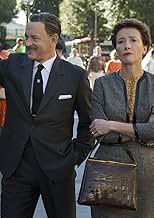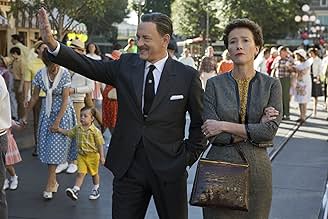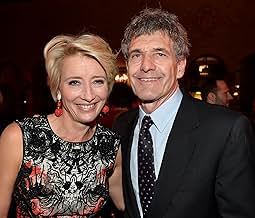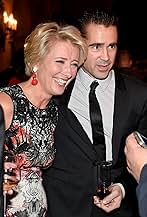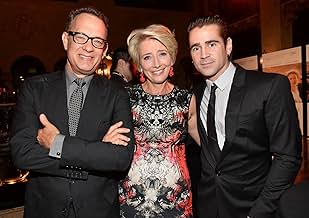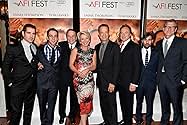Dans l'ombre de Mary : La Promesse de Walt Disney
Titre original : Saving Mr. Banks
- 2013
- Tous publics
- 2h 5min
L'écrivaine P.L. Travers revient sur son enfance après une rencontre à contrecoeur avec Walt Disney, qui cherche à adapter ses livres de Mary Poppins pour le grand écran.L'écrivaine P.L. Travers revient sur son enfance après une rencontre à contrecoeur avec Walt Disney, qui cherche à adapter ses livres de Mary Poppins pour le grand écran.L'écrivaine P.L. Travers revient sur son enfance après une rencontre à contrecoeur avec Walt Disney, qui cherche à adapter ses livres de Mary Poppins pour le grand écran.
- Réalisation
- Scénario
- Casting principal
- Nommé pour 1 Oscar
- 13 victoires et 74 nominations au total
Fuschia Sumner
- Flight Attendant
- (as Fuschia Kate Sumner)
Avis à la une
Emma Thompson is great fun to watch, always. Here, she plays Mrs Travers the one who dared to say no to Walt Disney. The movie, made by the Disney studios, would have us believe that Walt Disney was, well...Tom Hanks. No. Impossible, incredible, almost laughable but thanks to the power of the stars one can sit through it, thoroughly entertained by this work of fiction. The imperious character played by Emma Thompson as a theatrical rather than a cinematic experience is nonetheless engaging and moving. The flashbacks were, if you permit the impudence, a total miscalculation. They come back with annoying regularity and instead of adding, they detract from the central story. My favorite parts were the meeting between Mrs Travers and Saint Walt Disney in London and Mrs Travers inviting herself and sitting at the premiere of Mary Poppins.
Saving Mr Banks tells the story of Walt Disney's battle to get the rights to make Mary Poppins into a movie. I wasn't expecting to like this but was completely blown away.
It is beautifully put together, is hilarious in parts and very touching and emotional at other stages, but is not overly sappy or cheesy.
There are some outstanding performances here. Emma Thompson plays Mrs Travers beautifully - a cantankerous and stubborn lady, yet you can't dislike her. Tom Hanks does a good job of playing Walt Disney - a tough role for anyone but he seems to suit it, so long as you can get past the terrible fake southern accent which is worse than Dick Van Dyke's attempts at an English accent in Mary Poppins.
However the stand-out performance is, surprisingly, delivered by Colin Farrell as Mrs Travers' father. He brings amazing range and emotion to a character that is simultaneously a loving, sweet father and a man caged in by life and personal demons.
Go see it for yourself when it comes out at the end of November. I'm looking forward to watching it again.
It is beautifully put together, is hilarious in parts and very touching and emotional at other stages, but is not overly sappy or cheesy.
There are some outstanding performances here. Emma Thompson plays Mrs Travers beautifully - a cantankerous and stubborn lady, yet you can't dislike her. Tom Hanks does a good job of playing Walt Disney - a tough role for anyone but he seems to suit it, so long as you can get past the terrible fake southern accent which is worse than Dick Van Dyke's attempts at an English accent in Mary Poppins.
However the stand-out performance is, surprisingly, delivered by Colin Farrell as Mrs Travers' father. He brings amazing range and emotion to a character that is simultaneously a loving, sweet father and a man caged in by life and personal demons.
Go see it for yourself when it comes out at the end of November. I'm looking forward to watching it again.
This movie is much more than and definitely deeper than one would suspect from the 'syrupy' trailers most people have seen. The understory, gradually revealing the early life of P.L. Travers, the author of Mary Poppins, and depicting how the people in her dysfunctional family led her to write Mary Poppins, is the true core of this movie. I will never see Mary Poppins in quite the same way. All of the acting is superior, and the score is excellent. This is not the shallow, childlike movie that many will expect. I would not recommend it for children 11 and under, depending on the child. Otherwise, I highly recommend this movie, even if you are not a big fan of the original Mary Poppins film.
Walt Disney Pictures rarely aims for the Best Picture crown, being more a company focused on profits and sustaining its wildly popular brand. To make you haters hate more: they've earned $4 billion this year already and this includes the $200 million loss of Lone Ranger). They usually only distribute the movies that have a shot at Academy Awards immortality, with The Help (A Dreamworks film) being the latest example of a nominee and No Country For Old Men being their latest example of a winner.
But with Saving Mr. Banks, Disney is going the whole nine yards. With a stellar cast, seemingly endless budget (Giving John Lee Hancock a much-less stressful job in directing), high production value, and heavy dosage of drama that hides beneath the happier movie trailers, this film stands as one of the better dramas of the year and a sure-fire Oscar-contender. Touching upon the tissue-happy themes of forgiveness, family, and seeking happiness in a miserable world, prepare for waterworks throughout the two hours.
What makes this movie work more than anything else is the screenplay that didn't start in the studios of Disney, allowing for a more accurate portrayal of the true story behind the making of the masterpiece Mary Poppins----even if the entire world knows that with the backing of Disney some details will be left out. Kelly Marcel and Sue Smith weaved out an engaging story full of crisp dialogue and skillfully avoids becoming too overblown or too overdramatic. And whenever the movie gets close to being all-out depressing, we get treated to humorous moments here and there to keep the audience in check.
In a movie about artists that are addicted to their craft, you need actors that work with the same type of fervor. Emma Thompson despite not getting top billing gets the most screen time, gets the toughest job, and delivers the ultimate performance. She becomes very dislikable and yet sympathetic at the same time, and it is impossible to see anyone other than Thompson deliver this type of impact. Tom Hanks in an Oscar-baiting year does a superb job portraying the icon planet Earth knows and loves as he gives Walt Disney a humanized performance that separates the flawed man from the myth the Disney Company has feverishly worked to this day to protect. The rest of the cast does not disappoint, and we even see Colin Farrell potentially impress some Academy voters as the loving yet extremely defective father figure.
Disney's protection of its brand is the sole reason why Saving Mr. Banks could never ever ever ever ever ever be produced or made by anybody else. But luckily for all viewers, Disney doesn't pull back many punches in delivering the story behind the complex and conflicted making of Mary Poppins. It will be deep in the Golden Globes and the Academy Awards but ultimately indeed deserves the praise—even if you won't see all the details behind the true story on screen.
But with Saving Mr. Banks, Disney is going the whole nine yards. With a stellar cast, seemingly endless budget (Giving John Lee Hancock a much-less stressful job in directing), high production value, and heavy dosage of drama that hides beneath the happier movie trailers, this film stands as one of the better dramas of the year and a sure-fire Oscar-contender. Touching upon the tissue-happy themes of forgiveness, family, and seeking happiness in a miserable world, prepare for waterworks throughout the two hours.
What makes this movie work more than anything else is the screenplay that didn't start in the studios of Disney, allowing for a more accurate portrayal of the true story behind the making of the masterpiece Mary Poppins----even if the entire world knows that with the backing of Disney some details will be left out. Kelly Marcel and Sue Smith weaved out an engaging story full of crisp dialogue and skillfully avoids becoming too overblown or too overdramatic. And whenever the movie gets close to being all-out depressing, we get treated to humorous moments here and there to keep the audience in check.
In a movie about artists that are addicted to their craft, you need actors that work with the same type of fervor. Emma Thompson despite not getting top billing gets the most screen time, gets the toughest job, and delivers the ultimate performance. She becomes very dislikable and yet sympathetic at the same time, and it is impossible to see anyone other than Thompson deliver this type of impact. Tom Hanks in an Oscar-baiting year does a superb job portraying the icon planet Earth knows and loves as he gives Walt Disney a humanized performance that separates the flawed man from the myth the Disney Company has feverishly worked to this day to protect. The rest of the cast does not disappoint, and we even see Colin Farrell potentially impress some Academy voters as the loving yet extremely defective father figure.
Disney's protection of its brand is the sole reason why Saving Mr. Banks could never ever ever ever ever ever be produced or made by anybody else. But luckily for all viewers, Disney doesn't pull back many punches in delivering the story behind the complex and conflicted making of Mary Poppins. It will be deep in the Golden Globes and the Academy Awards but ultimately indeed deserves the praise—even if you won't see all the details behind the true story on screen.
Once upon a time (seeing as though that's how all fairy tales seem to start), there lived a boy from Missouri, called Walt Disney. This boy had a piece of paper with a mere sketch of a mouse upon it. Who ever would have thought that this was to be the start of such a great legacy? In 1961, Walt Disney invited P.L Travers, the author of "Mary Poppins", to his California studios to discuss the possibility of acquiring the rights to her book - a discussion that Mr. Disney had initially sparked twenty years prior. For those two decades, the proud author refused to depart with her precious work in fear of Hollywood's mutilation of it and repeatedly told Mr. Persistent to go 'fly a kite
up to the highest heights'. However, when sales of her book begin to dwindle and with a rough economic climate ahead, Travers reluctantly agreed to travel across the Atlantic to hear what the impresario had to say. This untold backstory of how Travers' classic work of literature made it to the big screen provides the substance for John Lee Hancock's Saving Mr. Banks. Here, we have an American icon that plays an American icon. Two-time Academy Award winner Tom Hanks delivers extraordinary sense of character as he renders Mr. Walt Disney with expert attention to detail. "There's a lot of voice work, the way he walks, the body positions, the way he holds his hands, the way he touches his moustache. How he phrases things and lets sentences roll off the end", Hancock remarks - and so Tom Hanks becomes the public face for Walt Disney and we learn of the man behind the mask (with two fluffy ears). Our central protagonist is Mrs. P. L Travers, played by Emma Thompson (who similarly boasts two Academy Awards). "She was a wonderful case study, requiring so many different shades. She was just so complex. She's one of the most complicated people I've ever encountered", says the British actress. Her rendition of a tetchy and cantankerous author who's plagued by the memories of her past is brilliantly executed. As narrative flashbacks delve into Mrs. Travers' childhood, we soon realise the true depth of her literary creation, Mary Poppins. Mr. Banks explores the bond between a young Travers (then Helen) and her drunkard father, Travers Goff (exceptionally played by Colin Farrell). Like a puzzle, the story is pieced together, bit by bit and we learn that her deep-seated adoration for her father is what lies at the heart of her magical masterpiece. Demonstrating that her novel holds such personal significance, Travers continues to exercises a stubborn reluctance to hand the rights to her book over to what she considers to be a dollar-printing machine. The straight-talking novelist is repulsed by Disney's empire and this is only intensified when the entertainment wizard showers her in all kinds of ridiculous merchandise. As Walt Disney haplessly pursues Travers, unsettling the adamant writer with his vision of the film, it seems that he will never obtain the rights to make the movie of Mary Poppins. We are, of course, watching this in hindsight and the knowledge that the book was made into a successful film adds a magical quality to the experience and permits laughter as it plays on dramatic irony; and there are some real gems for the Disney die-hards. Walt Disney made a promise to his daughter to make the movie of Mary Poppins. As the likelihood of fulfilling this promise fades into the distance, the entertainment-guru reaches into his own childhood and discovers a new, more personal connection to the emotionally troubled Travers. In order to break away from a life dictated by her past, Travers agrees to sign the waiver so that one the most lovable films in cinematic history can be made. This biographical dramedy stands as a poetic tale of hope, which ultimately gives testament to the might of the mouse house and conveys the magical idea that everybody has a story to tell. Making memories is what Disney is all about and for its 125-minute runtime, we re-visit old memories and we also create new ones. With all the conventions of a family film (after all, this is Disney), Saving Mr. Banks is supercalifragilisticexpialidocious! (Couldn't resist).
Le saviez-vous
- AnecdotesP.L. Travers never did warm up to the song "Let's Go Fly a Kite" as depicted in this movie. According to Richard M. Sherman, it was "Feed the Birds" that won her over.
- GaffesThe other drivers at the airport hold signs bearing logos of Warner Brothers and MGM adopted sometime after 1961.
- Citations
Walt Disney: George Banks and all he stands for will be saved. Maybe not in life, but in imagination. Because that's what we storytellers do. We restore order with imagination. We instill hope again and again and again.
- Crédits fousThe credits also have an actual audio recording of P.L. Travers conversing with the filmmakers like the ones depicted in the film.
- Bandes originalesChim, Chim, Cher-ee
Written by Richard M. Sherman (as Richard Sherman) and Robert B. Sherman (as Robert Sherman)
Performed by Randy Kerber
Meilleurs choix
Connectez-vous pour évaluer et suivre la liste de favoris afin de recevoir des recommandations personnalisées
Détails
- Date de sortie
- Pays d’origine
- Site officiel
- Langue
- Aussi connu sous le nom de
- El sueño de Walt
- Lieux de tournage
- Sociétés de production
- Voir plus de crédits d'entreprise sur IMDbPro
Box-office
- Budget
- 35 000 000 $US (estimé)
- Montant brut aux États-Unis et au Canada
- 83 301 580 $US
- Week-end de sortie aux États-Unis et au Canada
- 413 373 $US
- 15 déc. 2013
- Montant brut mondial
- 117 867 984 $US
- Durée2 heures 5 minutes
- Couleur
- Mixage
- Rapport de forme
- 2.39 : 1
Contribuer à cette page
Suggérer une modification ou ajouter du contenu manquant







